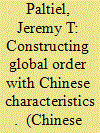| Srl | Item |
| 1 |
ID:
108970


|
|
|
|
|
| Publication |
2011.
|
| Summary/Abstract |
Ancient Chinese Thought, Modern Chinese Power is the latest publication to come from Yan Xuetong's ongoing research project that explores the interstate political philosophy of China's pre-Qin era.1 This book is interesting on many levels, and has already drawn attention from public intellectuals and scholars in the West.2 This essay thus first will examine the scholarly issue of how Yan and his colleagues are employing pre-Qin thought to make philosophical and political arguments about how China will rise. It will consider the relation of the 'kingly way' (wang ?) and the 'hegemonic way' (ba ?) to critically analyze Yan's argument that China should create a new kind of world leadership by pursuing political power, rather than economic and/or military power. While the book translates wang loosely as 'humane authority', we will argue that the literal translation 'kingly way' better reflects Yan's arguments for a new world order that is determined by the moral leadership of China's political elite. Building on this detailed textual analysis, the essay then will locate the book's arguments in wider academic debates about international relations theory, the role of the public intellectual in China, and the politics of translation. Lastly, the essay argues that the book is geared towards two audiences beyond the academy, to advise China's political leaders and reassure the West. The goal is to see how Ancient Chinese Thought, Modern Chinese Power revives-and reinterprets-traditional ideals to chart China's future as the world's future.
|
|
|
|
|
|
|
|
|
|
|
|
|
|
|
|
| 2 |
ID:
108972


|
|
|
|
|
| Publication |
2011.
|
| Summary/Abstract |
China's rise as a great power has promoted a great deal of soul searching among Chinese scholars, and concern about whether China's contribution to the world of International Relations scholarship lags behind its rise as an important shaper of the international system. There is a common understanding that China cannot escape addressing the role of theoretical discourse in directing Chinese foreign policy and framing its understanding of China's role in the world. A perception of China as suffering from a dependent relationship to International Relations (IR) theory, and a desire to transform the role of Chinese scholars from consumers of theory to its producers inspires a debate over the formation of a distinctive 'Chinese school'.
|
|
|
|
|
|
|
|
|
|
|
|
|
|
|
|
| 3 |
ID:
108973


|
|
|
|
|
| Publication |
2011.
|
| Summary/Abstract |
Two factors characterize the rising great powers during the industrial era: the first is the accumulation of power and wealth; the second is the use of this power and wealth either to obtain a dominant position or to reshape the international order. What is perplexing is that some states are keen to challenge the international status-quo even before accumulating the requisite power, while others have no desire to challenge the dominant power or the international status quo, even after developing the power needed to do so. Recent history provides clear examples of both scenarios: Germany under Wilhelm II is an example of the former, and America between the World War I and World War II demonstrates the latter. How might we explain this variation in behaviour of rising powers? In particular, why do states, which have yet to accumulate requisite power, mount aggressive challenges against dominant states that have a slim chance of success, rather than wait for a more opportune point in their development? What factors determine the strategic choices of rising powers?
|
|
|
|
|
|
|
|
|
|
|
|
|
|
|
|
| 4 |
ID:
108975


|
|
|
|
|
| Publication |
2011.
|
| Summary/Abstract |
There is an adage in China '???? (Wú Yuè tóng zhou)', which translates as 'Wu and Yue in the same boat'. This purportedly refers to events during the Spring and Autumn Period (770-221 BC) of the Zhou Dynasty that forced two rival states, the Wu and the Yue, to cooperate in dealing with widespread flooding. The phrase characterizes situations in which adversaries must join forces to overcome a common challenge, and is possibly the etymological foundation of the English phrase 'to be in the same boat'. Certain scholars contend that the axiom exemplifies the political relationship between the United States and China.1
Yan Xuetong has recently introduced in the Chinese Journal of International Politics the genesis of a fruitful discussion that has been carried forward by Alastair Iain Johnston in regard to explaining the Sino-American relationship.2 Essentially, Yan has put forth a theory of 'superficial friendship' wherein he argues that mutually unfavourable interests exceed mutually favourable interests in the Sino-American relationship. This, coupled with high expectations that both nations have in regard to support from one another, engenders the development of a 'superficial friendship'.3 Yan further posits that superficial friendships are unstable relationships that propagate exaggerated highs and lows, which helps to explain why the Sino-American relationship tends to exhibit wild oscillations.
|
|
|
|
|
|
|
|
|
|
|
|
|
|
|
|